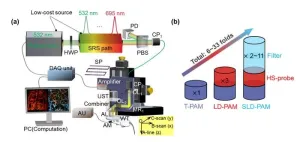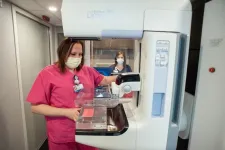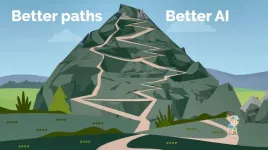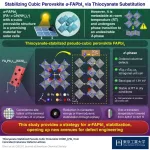(Press-News.org) INDIANAPOLIS – Mentorship has existed throughout history. Socrates mentored Plato, who, in turn, mentored Aristotle. Humphry Davy, the chemist who was the first to isolate potassium, sodium and at least five other elements, mentored Michael Faraday, inventor of the world’s first electric generator. Sigmund Freud mentored Carl Jung. Science teacher Elizabeth Mommaerts mentored Sally Ride. Maya Angelou mentored Oprah Winfrey. The list of knowledge bearers and knowledge seekers who have connected meaningfully goes on and on.
According to Regenstrief Institute Research Scientist and Indiana University School of Medicine Professor Malaz Boustani, M.D., MPH, it’s time to update and invigorate mentorship relationships in the sciences to produce better outcomes. He has coined the new model agile mentorship that benefits both mentee and mentor as it grows the social capital of the scientific community across generations.
“Agile mentorship is an evolving, adaptive and personalized process of information exchange with a widely important goal of supporting an individual to excel in their potential and to become as good and ideally better than the mentor. It highlights personalization and constant optimization to ensure that the mentorship relationship is as good as possible across time and across context,” said Dr. Boustani. “We call the process agile mentorship, but it's really the same thing, with a bit of embellishment, that's been developed at Regenstrief Institute by Clem McDonald, M.D., who mentored William (Bill) Tierney, M.D., who mentored Christopher (Chris) Callahan, M.D., who mentored me. And I have passed it along to my mentees, some of whom, like Babar Khan, M.D., M.S., are now mentoring other scientists.
“To advance science, to fulfill the legacy of Sam Regenstrief to transform the healthcare system, you need amazing scientists who will be able to change the way we deliver medicine, deliver healthcare and improve access to that care. This requires training and mentoring by individuals who have high levels of skills and competency and the ability and interest to pay it forward and recognize that the most important element contributing to the success of junior faculty or trainee is to have a mentor who provides a psychosocial safety net for mentee success. And, of course, there needs to be willingness of the prospective mentee to reach out to find the right mentor – not a boss or a coach but a true mentor putting themselves forward to benefit another.”
Agile mentorship requires both the mentee and the mentor to prioritize the relationship, making themselves available in spite of many competing career demands, including the ongoing search for financial support for research and constantly looming research deadlines.
In a paper published in the peer-reviewed ATS Scholar, “Agile Mentorship: A Longitudinal Exploratory Analysis,” Heidi Lindroth, PhD, R.N., Dr. Boustani and co-authors provide an inside perspective of Dr. Lindroth’s mentee experience with agile mentorship over the five years she and Dr. Boustani engaged in the process, starting when Dr. Lindroth was a post-doctoral fellow and researcher at Regenstrief Institute. With Dr. Boustani’s mentorship, Dr. Lindroth led the study design, interpretation of data, and preparation of the manuscript, supported by a National Institute of Health’s National Institute on Aging Career Development Award (K23AG076662).
The authors pinpointed four themes that are pillars of agile mentoring:
identification of shortcomings
adaptive perspective
managing relationships
personal growth
awareness
continual reflection
toolkit development
“Over the past five years working with Dr. Boustani, I have developed new skills and grown as a scientist because of his mentorship using the agile mentorship model. Our weekly meetings set the stage for success and influenced my career path, including my NIH career development award and my successful track record of publications. Our weekly huddle has provided the needed time and space to develop trust and psychological safety, which was essential to exploring, identifying and addressing my individualized needs and building reliable processes for managing relationships, communication and personal growth. Over time, I developed a practice of continual reflection that has sustained my growth. I am so thankful that I can pay this experience forward by mentoring future scientists and agile change agents,” said Dr. Lindroth, now a Mayo Clinic Division of Nursing Research senior associate consultant and Regenstrief Institute affiliated scientist.
Dr. Lindroth’s mentor, Dr. Boustani, was himself a mentee for five years and has been a mentor for 16 years to researchers, clinicians, healthcare system leaders and to an individual who recently launched a health-focused start-up company. Currently, he is mentoring seven junior scientists. He notes, “agile mentorship is a growth and a leadership process that is adaptable, that is personalized with the goal of building a social relationship and exchanging knowledge and skills across time and space as well as across generations. It’s a scalable and sustainable framework that is adaptable to various career development processes within the sciences and beyond.”
Authors of the ATS Scholar paper and their affiliations
Heidi Lindroth1,2,3; Caroline Shumaker3,4,5; Britain Taylor3,6; Zayn Boustani3,4,5 and Malaz Boustani2,3.
1 Division of Nursing Research, Department of Nursing, Mayo Clinic, Rochester, MN
2 Center for Aging Research, Regenstrief Institute, Indianapolis, IN
3 Center for Health Innovation and Implementation Science, School of Medicine, Indiana University, Indianapolis, IN
4 Department of Biology, College of Arts and Sciences, Indiana University, Bloomington, IN
5 Department of Psychological and Brain Sciences, College of Arts and Sciences, Indiana University, Bloomington, IN
6 The Luddy School of Informatics, Computing, and Engineering, Indiana University, Bloomington, IN
About Malaz Boustani, M.D., MPH
In addition to his role as a research scientist at Regenstrief Institute, Malaz Boustani, M.D., MPH, is the founding director of the Center for Health Innovation and Implementation Science. He is the Richard M. Fairbanks Professor of Aging Research at Indiana University School of Medicine. Dr. Boustani is also director of care innovation at Eskenazi Health.
About Regenstrief Institute
Founded in 1969 in Indianapolis, the Regenstrief Institute is a local, national and global leader dedicated to a world where better information empowers people to end disease and realize true health. A key research partner to Indiana University, Regenstrief and its research scientists are responsible for a growing number of major healthcare innovations and studies. Examples range from the development of global health information technology standards that enable the use and interoperability of electronic health records to improving patient-physician communications, to creating models of care that inform clinical practice and improve the lives of patients around the globe.
Sam Regenstrief, a nationally successful entrepreneur from Connersville, Indiana, founded the institute with the goal of making healthcare more efficient and accessible for everyone. His vision continues to guide the institute’s research mission.
About IU School of Medicine
IU School of Medicine is the largest medical school in the U.S. and is annually ranked among the top medical schools in the nation by U.S. News & World Report. The school offers high-quality medical education, access to leading medical research and rich campus life in nine Indiana cities, including rural and urban locations consistently recognized for livability.
END
Out with the old, in with the new: Agile mentorship to support future scientists
Updated and invigorated mentorship model to grow scientific community’s social capital across generations.
2023-08-31
ELSE PRESS RELEASES FROM THIS DATE:
CityU researchers develop ultra-sensitive photoacoustic microscopy for wide biomedical application potential
2023-08-31
Optical-resolution photoacoustic microscopy is an up-and-coming biomedical imaging technique for studying a broad range of diseases, such as cancer, diabetes and stroke. But its insufficient sensitivity has been a longstanding obstacle for its wider application. Recently, a research team from City University of Hong Kong (CityU) developed a multi-spectral, super-low-dose photoacoustic microscopy system with a significant improvement in the system sensitivity limit, enabling new biomedical applications and clinical translation in the future.
Photoacoustic ...
Henry Ford Health Hospitals earn full reaccreditation from National Accreditation Program for Breast Centers
2023-08-31
DETROIT – All five of Henry Ford Health’s acute care hospitals have earned a full three-year reaccreditation by the National Accreditation Program for Breast Centers (NAPBC), a quality program administered by the American College of Surgeons. With Henry Ford Hospital Detroit, Henry Ford Jackson Hospital, Henry Ford Macomb Hospital, Henry Ford West Bloomfield Hospital and Henry Ford Wyandotte Hospital earning full reaccreditation, Henry Ford has the highest number of Commission on Cancer and NAPBC-accredited hospitals of any health system in Michigan.
“The NAPBC accreditation is reflective of our unwavering commitment ...
Is digital media use a risk factor for psychosis in young adults?
2023-08-31
On average, young adults in Canada spend several hours on their smartphones every day. Many jump from TikTok to Netflix to Instagram, putting their phone down only to pick up a video game controller. A growing body of research is looking into the potential dangers of digital media overuse, as well as potential benefits of moderate digital media use, from a mental health standpoint.
A recent McGill University study of 425 Quebecers between the ages of 18 and 25 has found that young adults who have more frequent psychotic experiences also tend to spend more time using digital media. Interestingly, the study, which surveyed the participants ...
Why men, wealthy people and maritime residents are more likely to develop skin cancer
2023-08-31
A new study led by McGill University examines why people living in Atlantic regions are more at-risk for developing melanoma than other Canadians, providing lessons on skin cancer prevention for the whole country.
Rates of melanoma, a deadly form of skin cancer, have been rising globally, including in Canada. Current estimates indicate that up to 1 in 3 Canadians will develop some form of skin cancer during their lifetime. While some Atlantic provinces such as Prince Edward Island (PEI) and Nova Scotia have the highest incidence rate of melanoma in the country, neighbouring provinces like New Brunswick ...
The search for the super potato
2023-08-31
As climate change continues to pose severe challenges to ensuring sustainable food supplies around the world, scientists from McGill University are looking for ways to improve the resilience and nutritional quality of potatoes. Professor Martina Strömvik and her team have created a potato super pangenome to identify genetic traits that can help produce the next super spud.
“Our super pangenome sheds light on the potato’s genetic diversity and what kinds of genetic traits could potentially be bred into our modern-day crop to make it better,” ...
Better paths yield better AI
2023-08-31
Deep Learning (DL) performs classification tasks using a series of layers. To effectively execute these tasks, local decisions are performed progressively along the layers. But can we perform an all-encompassing decision by choosing the most influential path to the output rather than performing these decisions locally?
In an article published today in Scientific Reports, researchers from Bar-Ilan University in Israel answer this question with a resounding "yes". Pre-existing deep architectures have been improved by updating the most influential paths to the output.
"One can ...
Children’s books are still Whiter, and more male, than US society
2023-08-31
A new paper in the Quarterly Journal of Economics, published by Oxford University Press, finds that children’s books in the United States continue to underrepresent ethnic minorities. In addition, it finds that male characters are overrepresented in such stories and children are often presented with lighter skin tones for no apparent editorial reason.
Education teaches children about the world, its people, and their place in it. Much of this happens through the books society presents to children ...
New insight for stabilizing halide perovskite via thiocyanate substitution
2023-08-31
α-FAPbI3, a promising solar cell material with a cubic perovskite structure that is metastable at room temperature, can be stabilized by introducing a pseudo-halide ion like thiocyanate (SCN–) into its structure, demonstrated by Tokyo Tech researchers in a new study. Their finding provides new insights into the stabilization of the α-phase via grain boundary and pseudo-halide engineering.
The light we receive every day from the Sun, if harnessed efficiently, can help us tackle the ongoing global energy crisis as well as our concern with climate change. Materials with good photophysical properties, i.e., light absorption, ...
Scientists develop finger sweat test to detect antipsychotic drugs in patients
2023-08-31
Antipsychotic drugs treat incredibly vulnerable patients. Maintaining a treatment regimen is difficult for many patients, but not taking the medication is associated with a higher risk of poor health outcomes. These drugs are also very powerful with strong side-effects, and blood tests are often used to calibrate a patient’s dosage and confirm that they are taking the recommended dose.
However, blood tests are invasive and potentially uncomfortable. Scientists have now discovered a way to test the levels of common antipsychotic drugs in the sweat ...
Acting fast when an epidemic hits
2023-08-31
A team of researchers at the University of Waterloo and Dalhousie University have developed a method for forecasting the short-term progression of an epidemic using extremely limited amounts of data.
Their model, the Sparsity and Delay Embedding-based Forecasting model, or SPADE4, uses machine learning to predict the progression of an epidemic using only limited infection data. SPADE4 was tested on both simulated epidemics and real data from the fifth wave of the Covid-19 pandemic in Canada and successfully predicted the epidemics’ progressions with 95 per cent confidence.
“Covid taught us that we really need to come up with methods ...
LAST 30 PRESS RELEASES:
Scientists discover why we know when to stop scratching an itch
A hidden reason inner ear cells die – and what it means for preventing hearing loss
Researchers discover how tuberculosis bacteria use a “stealth” mechanism to evade the immune system
New microscopy technique lets scientists see cells in unprecedented detail and color
Sometimes less is more: Scientists rethink how to pack medicine into tiny delivery capsules
Scientists build low-cost microscope to study living cells in zero gravity
The Biophysical Journal names Denis V. Titov the 2025 Paper of the Year-Early Career Investigator awardee
Scientists show how your body senses cold—and why menthol feels cool
Scientists deliver new molecule for getting DNA into cells
Study reveals insights about brain regions linked to OCD, informing potential treatments
Does ocean saltiness influence El Niño?
2026 Young Investigators: ONR celebrates new talent tackling warfighter challenges
Genetics help explain who gets the ‘telltale tingle’ from music, art and literature
Many Americans misunderstand medical aid in dying laws
Researchers publish landmark infectious disease study in ‘Science’
New NSF award supports innovative role-playing game approach to strengthening research security in academia
Kumar named to ACMA Emerging Leaders Program for 2026
AI language models could transform aquatic environmental risk assessment
New isotope tools reveal hidden pathways reshaping the global nitrogen cycle
Study reveals how antibiotic structure controls removal from water using biochar
Why chronic pain lasts longer in women: Immune cells offer clues
Toxic exposure creates epigenetic disease risk over 20 generations
More time spent on social media linked to steroid use intentions among boys and men
New study suggests a “kick it while it’s down” approach to cancer treatment could improve cure rates
Milken Institute, Ann Theodore Foundation launch new grant to support clinical trial for potential sarcoidosis treatment
New strategies boost effectiveness of CAR-NK therapy against cancer
Study: Adolescent cannabis use linked to doubling risk of psychotic and bipolar disorders
Invisible harms: drug-related deaths spike after hurricanes and tropical storms
Adolescent cannabis use and risk of psychotic, bipolar, depressive, and anxiety disorders
Anxiety, depression, and care barriers in adults with intellectual and developmental disabilities
[Press-News.org] Out with the old, in with the new: Agile mentorship to support future scientistsUpdated and invigorated mentorship model to grow scientific community’s social capital across generations.



